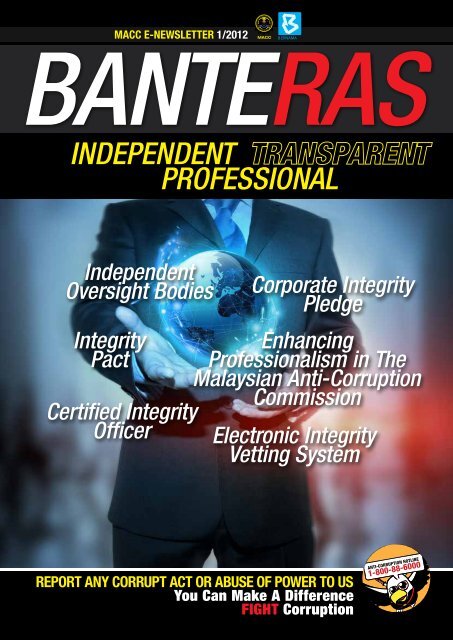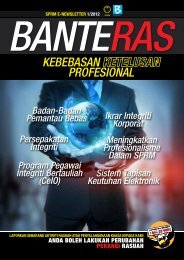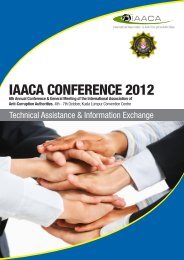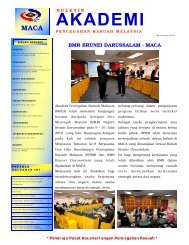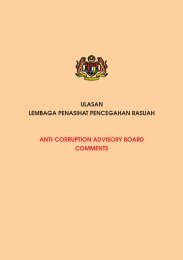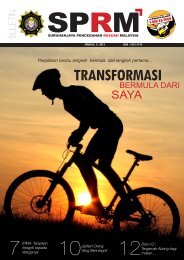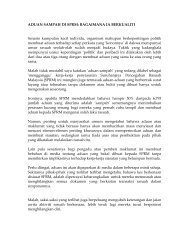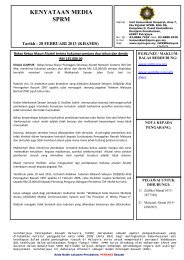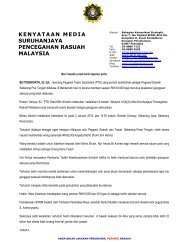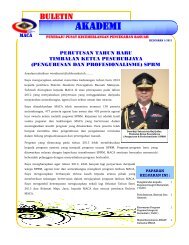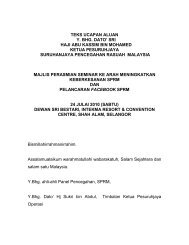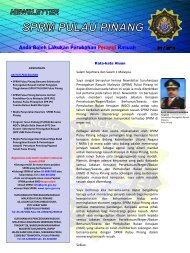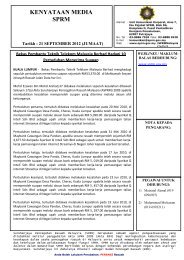eNewsletter SPRM - Banteras
eNewsletter SPRM - Banteras
eNewsletter SPRM - Banteras
Create successful ePaper yourself
Turn your PDF publications into a flip-book with our unique Google optimized e-Paper software.
MACC E-NEWSLETTER 1/2012<br />
MACC<br />
B ERNAMA<br />
BANTERAS<br />
INDEPENDENT<br />
PROFESSIONAL<br />
Independent<br />
Oversight Bodies<br />
Integrity<br />
Pact<br />
Certified Integrity<br />
Officer<br />
Corporate Integrity<br />
Pledge<br />
Enhancing<br />
Professionalism in The<br />
Malaysian Anti-Corruption<br />
Commission<br />
Electronic Integrity<br />
Vetting System<br />
REPORT ANY CORRUPT ACT OR ABUSE OF POWER TO US<br />
You Can Make A Difference<br />
FIGHT Corruption<br />
ANTI-CORRUPTION HOTLINE<br />
1-800-88-6000
CONTENTS<br />
03 l Editor’s Note<br />
04-05 l Independent<br />
Oversight Bodies<br />
Ensuring that MACC is<br />
Transparent and<br />
Independent in carrying<br />
INTEGRITY out its responsibilities PACTINTEGRITY PACT<br />
INTEGRITY PACT<br />
INTEGRITY PACTINTEGRITY PACT<br />
INTEGRITY PACT<br />
INTEGRITY PACT<br />
INTEGRITY PACTINTEGRITY PACT<br />
INTEGRITY PACT<br />
INTEGRITY PACTINTEGRITY PACT<br />
INTEGRITY PACT<br />
INTEGRITY PACT<br />
06 l Integrity Pact<br />
Preventing Corruption<br />
in Government<br />
Procurement<br />
07 l Corporate<br />
Integrity Pledge (CIP)<br />
Corporate Citizens Join<br />
in the Fight Against<br />
Corruption<br />
INTEGRITY PACT<br />
INTEGRITY PACT<br />
INTEGRITY PACT<br />
INTEGRITY PACT<br />
INTEGRITY PACTINTEGRITY PACT<br />
INTEGRITY PACT<br />
INTEGRITY PACTINTEGRITY PACT<br />
INTEGRITY PACT<br />
INTEGRITY PACTINTEGRITY PACT<br />
INTEGRITY PACT<br />
08-10 l IAACA Roundup<br />
: Key Speakers’ Comments<br />
12-13 l Views From<br />
The Panel<br />
Transparency Must Be<br />
Viewed From The Right<br />
Perspective<br />
14-15 l Views From<br />
The Panel<br />
Enhancing Professionalism<br />
In The Malaysian<br />
Anti-Corruption<br />
Commission<br />
16 l Electronic<br />
Integrity Vetting<br />
System<br />
17 l Certified Integrity<br />
Officer Programme<br />
(CeIO)<br />
Building integrity and<br />
respect for noble values<br />
at the work place<br />
Public<br />
60.13%<br />
Council Members<br />
1 person<br />
Politicians<br />
3 persons<br />
Private Sector<br />
90 persons<br />
Civillians<br />
274 persons<br />
SECTOR NO OF PEOPLE PERCENTAGE (%)<br />
Civil Servant 244 39.87%<br />
Top Management 0<br />
Management &<br />
66<br />
Professionals<br />
Support Group 178<br />
Public 368 60.13%<br />
Private Sector 90<br />
Civillians 274<br />
Council Members 1<br />
Politicians 3<br />
Management &<br />
Professionals<br />
66 persons<br />
Support Group<br />
178 persons<br />
Civil Servant<br />
39.87%<br />
19 l Statistics of<br />
Arrests<br />
January to October 2012<br />
TOTAL 612 100%<br />
20 l MACC Strengthens<br />
Cooperation With<br />
Brunei Anti-Corruption<br />
Bureau (BMR)<br />
21 l The Malaysia<br />
Anti-Corruption<br />
Academy (MACA)<br />
Enhancing the capacity<br />
and professionalism of<br />
anti-corruption practitioners<br />
around the world<br />
23-24 l At The Courts<br />
MACC Deputy Public<br />
Prosecutors put away<br />
graft offenders<br />
27 l Tidbits<br />
28 l Felda’s Anti-graft<br />
Move Lauded<br />
29 l SPNB’s Reward<br />
System Helps Curb<br />
Corruption<br />
30 l Corruption mars<br />
Malaysia League<br />
Football<br />
Editor’s Note<br />
Ensuring the MACC is INDEPENDENT, TRANSPARENT<br />
and PROFESSIONAL<br />
The RM276 million allocated to the Malaysian Anti-Corruption Commission<br />
(MACC) as announced by the Prime Minister Datuk Seri Najib<br />
Tun Razak during the tabling of the 2013 Budget in parliament recently,<br />
and the move to strengthen the Malaysian Anti-Corruption Commission<br />
staff force by another 5000 officers by means of an annual<br />
recruitment programme of 150 personnel, reflects the government’s<br />
unwavering support and commitment in the fight against corruption.<br />
The allocation will go a long way in enhancing and improving enforcement,<br />
prevention and education expertise; thereby effectively<br />
transform the MACC into an INDEPENDENT, TRANSPARENT, PROFES-<br />
SIONAL and effective anti-corruption authority that is truly efficient in<br />
tandem with the Government Transformation Programme<br />
Under the watchful eyes and guidance from distinguished members<br />
of the Anti-Corruption Advisory Board, the Special Committee on Corruption,<br />
the Complaints Committee, the Operations Review Panel, and<br />
the Consultation and Corruption Prevention Panel; the Malaysian Anti-<br />
Corruption Commission will remain INDEPENDENT, TRANSPARENT,<br />
and PROFESSIONAL.<br />
In collaboration with the Attorney General’s Chambers, the Malaysian<br />
Anti-Corruption Commission has implemented proactive measures<br />
to prevent corrupt practices and the abuse of power in government<br />
agencies and government-linked corporations. These initiatives include<br />
the Integrity Pact (IP) in Government Procurement, the Corporate<br />
Integrity Pledge (CIP), the appointment of Chief Integrity Officers<br />
(CIO), and the Electronic Integrity Vetting System (eSTK).<br />
No effort is spared in the quest to fight corruption. The MACC will<br />
continue to introduce new measures designed to eliminate the opportunity<br />
for corrupt practices and abuse of power, with a view of<br />
improving Malaysia’s Corruption Perception Index (CPI) to 7.0 by the<br />
year 2015.<br />
At the global level, the Malaysian Anti-Corruption Commission enhances<br />
its international networking by playing an active if not a<br />
leading role at events organised by the United Nations Convention<br />
Against Corruption (UNCAC). In this regard, the MACC had the honour<br />
of hosting the 6th Conference and Annual General Meeting of the<br />
International Association of Anti-Corruption Authorities (IAACA) from<br />
October 4 – 7 recently. Carrying the theme ‘Technical Assistance and<br />
Information Exchange’, the conference was the perfect occasion to<br />
establish close rapport and cooperation with anti-corruption authorities<br />
around the globe.<br />
Undoubtedly, the corruption scourge is a threat to national security. It<br />
compromises moral values, weakens the country’s financial stability.<br />
The MACC leaves no stone unturned in its quest to develop consistent<br />
and effective anti- corruption measures on the one hand, and to<br />
inculcate anti-corruption culture among Malaysians from all walks of<br />
life on the other. In this context, the Malaysia Anti-Corruption Academy<br />
(MACA) is conducting a Masters Programme in Social Science<br />
(Corruption Studies) in collaboration with the National University of<br />
Malaysia (UKM). MACA is also working with the HELP University to offer<br />
a Master of Science Programme in Economic Crime Management.<br />
In addition, the MACC has successfully promoted the formation of Corruption<br />
Prevention Secretariat at various higher learning institutions.<br />
Proposals have been submitted to the relevant ministries to extend<br />
similar secretariats at Institute of Teachers Education nationwide as<br />
well as to incorporate elements of integrity and corruption prevention<br />
in the curriculums for primary and secondary schools.<br />
Under the ‘Anti-Corruption Campaign Through Taxis’ programme, taxi<br />
drivers in the Klang Valley have been roped as ‘Anti-Corruption Ambassadors’.<br />
They will display anti-corruption advertisements on their<br />
vehicles for three months starting from September.<br />
In the final analysis, the measure of a developed and sovereign nation<br />
rests not only on its economic development and technical advancement;<br />
the morality, integrity, and transparency of its leaders specifically<br />
and citizens generally, have an equal bearing.<br />
DC Datuk Shamshun<br />
Baharin Mohd Jamil<br />
Director, Community<br />
Education Division,<br />
Malaysian Anti-Corruption<br />
Commission<br />
“Under the watchful eye and guidance from distinguished<br />
members of the Anti-Corruption Advisory Board, the Special<br />
Committee on Corruption, the Complaints Committee, the Operations<br />
Review Panel, and the Consultation and Corruption<br />
Prevention Panel; the Malaysian Anti-Corruption Commission<br />
will remain INDEPENDENT, TRANSPARENT, and PROFESSIONAL”<br />
02<br />
11 l Corruption<br />
Perceptions Index<br />
Perception versus<br />
Reality<br />
18 l The Corruption<br />
Prevention Secretariat<br />
(CPS) Of Institute Of<br />
Higher Learning (IHL)<br />
Instilling An Anti-Corruption<br />
Culture In Our Youths<br />
25 l Politician’s<br />
Support for MACC Vital<br />
EDITORIALPANEL<br />
Publisher<br />
Datuk Seri Abu Kassim Mohamed<br />
Executive Advisor<br />
Datuk Sutinah Sutan<br />
Executive Publisher<br />
Datuk Shamshun Baharin Mohd Jamil<br />
Editor-in Chief<br />
Samsul Hj Salip<br />
Editor<br />
Muhammad Yusof Bahir<br />
Associate Editor<br />
BERNAMA<br />
Journalists<br />
Mohamad Tarmizie Abdul Manaf<br />
Muhamad Shariffuddin Shaari<br />
Faridah Mahabob<br />
Mohd Azhar Ibrahim (BERNAMA)<br />
Photography Editors<br />
Rosman Abu Bakar<br />
Ahmad Faidz Md Isa<br />
BERNAMA<br />
03
INDEPENDENT<br />
OVERSIGHT<br />
BODIES<br />
All the operational procedures of the<br />
MACC are monitored by five independent<br />
oversight bodies. They are :<br />
Ensuring that MACC is Transparent<br />
and Independent in carrying out its responsibilities<br />
There are five independent oversight bodies which monitor, supervise<br />
and advice the Malaysian Anti-Corruption Commission on its anti-corruption<br />
responsibilities. Members of these entities comprise distinguished<br />
and prominent Malaysians from both sides of the political divide,<br />
who are of good standing and were appointed as advisors under<br />
the MACC Act to ensure that the MACC is truly transparent and independent<br />
in carrying out its responsibilities.<br />
From Left : Dato’ Hj. Ismail bin Hj. Abd Mutalib,Dr. Tan Seng Giaw,Tuan Salahuddin bin Hj. Ayub,Dato’ Seri Mohd Radzi bin<br />
Sheikh Ahmad (Pengerusi),Senator Dato’ Armani binti Hj. Mahirudin,Senator Ir. Hj. Zamri bin Hj. Yusuf* and Dato’ Hj. Abdul<br />
Rahman bin Dahlan.<br />
From Upper Left : En. Chelvarajah R.R., Tan Sri Dato’ Seri Mohamed Jawhar bin Hassan, Dato’ Anwar bin Fazal,<br />
Prof. Emeritus Tan Sri Dr. Khoo Kay Kim and Prof. Tan Sri Dr. Mohd Kamal bin Hassan.<br />
From Lower Left : Tan Sri Datuk Amar (Dr.) Hj. Hamid bin Bugo,Tan Sri Dato’ Seri Megat Najmuddin bin Megat Khas,Tan Sri<br />
Datuk Yong Poh Kon,Puan Sri Zaitun Zawiyah binti Puteh (Pengerusi),Datuk Rashpal Singh a/l Jeswant<br />
Singh and Tan Sri Datuk Seri Panglima Simon Sipaun.<br />
From Upper Left : Datuk David Chua Kok Tee, Prof. Dr. Engr. Chin Yew Sin, Datuk Seri Wong Chun Wai, En. Syed Akbar<br />
bin Ali, En. Hj. Anis Yusal bin Yusoff, Datuk Marimuthu Nadason and Dr. Zainal Abidin bin Abdul Majeed.<br />
From Lower Left : Datuk Seri Azman bin Ujang, Tan Sri Dato’ Sri Dr. Lim Kok Wing, Datuk Johan bin Jaaffar (Pengerusi),<br />
Dato’ Dr. Ishak bin Tambi Kechik and Dato’ Prof. Emeritus Dr. Abdul Rahman bin Hj. Embong.<br />
From Upper Left : Pending Prof. Dr. Syed Noh bin Syed Ahmad,Datin Aminah Pit binti Abdul Rahman, En. Walter a/l Doss<br />
Sandosam.<br />
From Lower Left : Dato’ Zamani bin Abdul Ghani, Tan Sri Dato’ Cecil W. M. Abraham, Tan Sri Datuk Dr. Hadenan bin Abdul<br />
Jalil (Pengerusi), Dato’ Hamzah bin Kassim, En. Nik Mohd Hasyudeen bin Yusoff.<br />
Operations Review Panel<br />
Functions:<br />
• Review Investigation Papers opened by the MACC and<br />
seek further clarifications where necessary<br />
• Review the MACC’s report on Investigation Papers which<br />
exceeds a 12-month period<br />
• Review the MACC’s report on cases where suspectsarrested<br />
are released on bail bond for a period exceeding six<br />
months<br />
• Review the MACC’s report on decisions made by the Public<br />
Prosecutor on Investigation Papers<br />
• Review the MACC’s report on Investigation Papers submitted<br />
to the Public Prosecutor where no decisions were<br />
obtained after a period of six months and above<br />
• Present its views regarding further actions on cases where<br />
no charges are preferred<br />
• Advise and assist the MACC on the effectiveness of its<br />
investigation operations<br />
• Review and endorse any proposal to enhance the effectiveness<br />
of MACC investigation operations before submitting<br />
it to the Anti-Corruption Advisory Board<br />
• Prepare Annual Report and comments on the progress<br />
of MACC’s investigation operations, to be submitted to the<br />
Prime Minister.<br />
Special Committee on Corruption<br />
Funtions:<br />
• Advise the Prime Minister on any aspect of the corruption<br />
problem in Malaysia<br />
• Examine MACC’s Annual Report<br />
• Examine the comments of the Anti-Corruption Advisory<br />
Board on MACC’s performance<br />
• To seek MACC’s clarifications and explanations on its Annual<br />
Report and the comments of the Anti-Corruption Advisory<br />
Board<br />
From Left : En. Ravindran V. Muthu, Datuk Muhammad bin Mohd Noor, Datuk Haji Mohd Nor bin Abdullah (Pengerusi),<br />
Datuk Wan Abdul Wahab bin Abdullah and En. Chooi Mun Sou*.<br />
Complaints Committee<br />
Functions:<br />
• Monitor how the MACC handles complaints of misconduct<br />
against its officers<br />
• Identify weaknesses in MACC’s standard operating procedures<br />
and make appropriate recommendations as it deems fit<br />
Anti-Corruption Advisory Board<br />
Functions:<br />
• Advise the MACC on any aspect of the corruption<br />
problem in Malaysia<br />
• Advise the MACC on anti-corruption policies<br />
and strategies<br />
• Scrutinise and endorse proposals from the MACC<br />
• Scrutinise and endorse the resource needs of the MACC to<br />
ensure its effectiveness<br />
• Scrutinise the Annual Report of the MACC before its<br />
submission to the Special Committee on Corruption<br />
• Submit its comments to the Special Committee<br />
on Corruption<br />
Consultation and Corruption Prevention Panel<br />
Functions:<br />
• Review MACC’s practice, system and work procedures in<br />
areas that are susceptible to corruption in the public and<br />
private sectors, and make recommendations it deems fit<br />
• Review any MACC report and suggestion on how to prevent<br />
and eradicate corruption in the public and private sectors,<br />
and make recommendation it deems fit<br />
• Develop and legislate best practices in priority areas<br />
• Advise the MACC on how to implement programmes that<br />
are aimed at enhancing awareness and winning public support<br />
in fighting corruption<br />
• Review the effectiveness of MACC’s community education<br />
programmes and campaigns and make recommendations<br />
for improvement where necessary<br />
• Monitor public response, attitude and perception towards<br />
MACC’s anti-corruption efforts<br />
• Assist the MACC in liaising with the media and public<br />
communications sector in order to gain support for its anticorruption<br />
programmes and activities<br />
• Review proposals prepared by the Anti-Corruption Advisory<br />
Board and make recommendations where it deems fit<br />
• Prepare Annual Report and comments on MACC’s performance,<br />
to be submitted to the Prime Minister<br />
04 05
Integrity Pact<br />
Preventing Corruption in Government Procurement<br />
Integrity Pact (IP) in government<br />
procurement is one of the anticorruption<br />
initiative under the<br />
National Key Result Areas (NKRA).<br />
It serves to promote transparency<br />
in the government procurement<br />
process involving the issuance of<br />
license, permit, concession, and in<br />
selecting or appointing suppliers for<br />
public and corporate assets.<br />
Government agencies are required<br />
to insert an Anti-Corruption Clause<br />
in all their procurement documents.<br />
This undertaking eliminates any<br />
INTEGRITY PACTINTEGRITY PACT<br />
RITY PACT<br />
INTEGRITY PACT<br />
INTEGRITY PACT<br />
INTEGRITY PACT<br />
INTEGRITY PACT<br />
TEGRITY PACTINTEGRITY PACT<br />
ITY PACT<br />
INTEGRITY PACT<br />
INTEGRITY PACT<br />
INTEGRITY PACT<br />
opportunity for corruption and<br />
abuse of power in the procurement<br />
process.<br />
How It Works<br />
When a bidder receives an official<br />
invitation to participate in a tender<br />
submission to supply any work or<br />
services to a government agency,<br />
GRITY PACT<br />
PACT<br />
INTEGRITY PACT<br />
he/she is required to sign a Bidder<br />
Declaration Form pledging not resort<br />
to giving bribes to win the contract.<br />
The bidder must also submit the<br />
company’s Code of Conduct and<br />
a Compliance Programme that<br />
monitors and ensures that all<br />
company staff adhere to the former.<br />
The Declaration, Code of Conduct<br />
and Compliance Programme are<br />
to be submitted together with the<br />
Tender documents.<br />
Meanwhile on the government<br />
agency’s side, a civil servant who is<br />
directly or indirectly involved in the<br />
procurement must sign a Declaration<br />
pledging not to indulge in corrupt<br />
practices or the abuse of power in<br />
connection with the procurement.<br />
The same applies to those sitting<br />
in the Government Procurement<br />
Committee or Board.<br />
INTEGRITY PACT<br />
INTEGRITY PACT<br />
INTEGRITY PACT<br />
The Corporate Integrity Pledge (CIP)<br />
INTEGRITY PACT<br />
the Anti-Corruption Principles in its<br />
INTEGRITY PACT<br />
In short, both the parties to the<br />
contract formally declare their<br />
undertaking neither to give/take<br />
bribes nor to abuse the power<br />
vested in them.<br />
Credibility<br />
Just like the CPI, perceptions about<br />
a country’s procurement system<br />
are often taken to reflect the state<br />
of governance in that country. The<br />
implemetation of Integrity Pact in<br />
government procurement will greatly<br />
enhance the credibility of the public<br />
service generally, and the Malaysian<br />
Government in particular.<br />
INTEGRITY PACT<br />
INTEGRITY PACT<br />
INTEGRITY PACT<br />
INTEGRITY<br />
• STRENGTHEN its internal<br />
systems to prevent corrupt<br />
practices.<br />
PACTINTEGRITY PACT<br />
CORPORATE INTEGRITY<br />
PLEDGE (CIP)<br />
is jointly developed by the Malaysian<br />
Institute of Integrity (IIM), Transparency<br />
International – Malaysia (TI-M) and the<br />
Malaysian Anti-Corruption Commission<br />
(MACC). It is a manifestation of a<br />
corporation’s commitment to uphold<br />
daily operation.<br />
By signing the CIP, a company is<br />
making a unilateral declaration that<br />
it will strive to create a corruptionfree<br />
environment in conducting its<br />
business. That company also pledges<br />
that it will:<br />
• PROMOTE integrity, transparency<br />
and good governance.<br />
• ENSURE compliance to laws,<br />
policies and procedures relating<br />
to fighting corruption.<br />
• COMBAT all corrupt practices.<br />
• SUPPORT the Government<br />
Transformation Programme (GTP)<br />
to fight corruption.<br />
Through the implementation of the<br />
Corporate Integrity Pledge, corporate<br />
entities in Malaysia will create a<br />
business environment that is free from<br />
the debilitating effect of corruption.<br />
This will create a healthy competition<br />
and give a positive perception of<br />
Malaysia to foreign investors.<br />
Although there is no compulsion<br />
for corporations to take the pledge,<br />
the Malaysian Anti-Corruption<br />
Commission highly recommends<br />
Corporate Citizens Join in<br />
the Fight Against Corruption<br />
Corporate leaders at the launch of the Corporate Integrity Pledge under the Economic Transformation Programme (ETP)<br />
that government-linked corporations<br />
(GLCs) and private companies<br />
adopt the CIP to demonstrate their<br />
commitment towards creating a<br />
business environment that is fair,<br />
transparent and free from corruption.<br />
It will periodically collaborate with<br />
the corporations involved to ascertain<br />
that their business operations is really<br />
corruption-free<br />
In October 2011, 45 corporations had<br />
signed the Corporate Integrity Pact.<br />
Exactly one year later, this number has<br />
increased to 154.<br />
06 07
IAACA Roundup : Key Speaker’s Comments<br />
The Malaysian Anti-Corruption<br />
Commission hosted the 6th<br />
Conference and Annual General<br />
Meeting of the International<br />
Association of Anti-Corruption<br />
Authorities from 4th to 7th October<br />
recently. The event was<br />
attended by 300 organisational<br />
members from 170 countries,<br />
including prosecutors, investigators,<br />
and experts with extensive<br />
experience in anti-corruption<br />
research and practice.<br />
This is what some of them say<br />
about the efforts in fighting corruption<br />
in the country:<br />
“The MACC has one of the best<br />
anti-corruption strategies in the<br />
world such as its on-going education<br />
approach through the school children and capacity<br />
building. The IAACA conference in Malaysia is one of the<br />
best conferences that I have attended in every way”<br />
Michael Symons,<br />
Australia Anti-Corruption Consultants Director<br />
“The Malaysian government has taken a leadership<br />
role in corruption prevention – many of its<br />
initiatives are very innovative”<br />
Dimitri Vlasis,<br />
Chief Economic and Crime Branch,<br />
Division of Treaty Affairs,<br />
United Nations Office on Drugs and Crime (UNODC)<br />
“The battle against corruption is a long term<br />
effort and will mean a change in the value<br />
and ethics within the culture of Malaysians”<br />
Micheal J. Hershman,<br />
CEO Fairfax Group<br />
“The MACC is certainly one<br />
of the leaders in combating<br />
corruption in this region,<br />
the Commission is taking<br />
on corruption in bite size<br />
pieces and making tactical<br />
as well as co-ordinated approaches.<br />
Until you do what<br />
the MACC is doing, I do not<br />
think you can make significant progress. I am<br />
very impressed with the initiatives taken by the<br />
MACC”<br />
Daniel Eric Stonecipher,<br />
American Bar Association (Regional Anti-Corruption) Advisor<br />
“Malaysia is one of the very few countries<br />
that has an anti-corruption academy<br />
and in which its anti-corruption<br />
authority actively seeks to engage in<br />
cooperation and sharing experience with<br />
other anti-corruption authorities all over<br />
the globe”<br />
Martin Kreutner,<br />
International Anti-Corruption Academy<br />
There has always been a growing cooperation<br />
between INTERPOL and the MACC. Chief Commissioner<br />
Datuk Seri Abu Kassim Mohamed<br />
has contributed extensively to the INTERPOL<br />
Expert Group’s effort in coming out with the<br />
manual of Best Practices in anti-corruption and Asset Recovery.<br />
Jaganathan Saravanasamy,<br />
Assistant Director, Anti-Corruption, Sub-Directorate INTERPOL<br />
There are five independent supervisory bodies that<br />
oversee and supervise the conduct of the MACC officers<br />
and they constantly critique the work that has<br />
been done so to ensure it is performed to the highest<br />
level possible. The progress that MACC has made over<br />
the last ten years has been extraordinary and I am<br />
confident that the MACC will eventually set the benchmark<br />
in anti-corruption efforts in the region.<br />
Michel Girodo – Interpol Group of Experts on Corruption<br />
08 09
IAACA Roundup<br />
Measures To Fight Corruption Showing<br />
Positive Results - Muhyiddin<br />
KUALA LUMPUR – Key initiatives undertaken by Malaysia<br />
to weed out corruption are showing positive and tangible<br />
results, besides being effective in winning over the<br />
hearts and minds of the people, said Deputy Prime Minister<br />
Tan Sri Muhyiddin Yassin.<br />
He said a survey conducted by Transparency International<br />
last year, showed that 49 per cent of Malaysians felt<br />
that the government’s efforts in fighting corruption were<br />
effective, compared to only 29 per cent in 2009.<br />
“I’m certain that given time, Malaysia will be successful<br />
in its war on corruption, and further improve public<br />
perception towards the government’s anti-corruption efforts,”<br />
he said when closing the 6th International Association<br />
of Anti-Corruption Authorities (IAACA) Conference<br />
and General Meeting hosted by the Malaysian Anti-Corruption<br />
Commission recently.<br />
Among the initiatives and reforms introduced by the<br />
government in the war against graft include the Whistle<br />
Blower Protection Act 2010, special corruption courts,<br />
implementation of Integrity Pacts, corporate integrity<br />
pledge, as well as the Name and Shame Database.<br />
In addition to the ongoing initiatives, Muhyiddin said the<br />
government had allocated RM276 million in the recently<br />
tabled Budget 2013 for the Commission to carry out its<br />
duties.<br />
Muhyiddin said corruption was a global scourge<br />
that might damage poor and rich countries<br />
Malaysia On<br />
Track In Fighting<br />
Corruption<br />
Datuk Seri Idris Jala<br />
10<br />
alike, undermining<br />
commitments to<br />
sustain economic<br />
prosperity and social<br />
well-being.<br />
Therefore, he<br />
called upon the<br />
governments of<br />
IAACA member<br />
states to continuously<br />
work together, especially i n<br />
sharing experiences and best-<br />
practices<br />
to facilitate greater capacity building in a bid to fight<br />
corruption more effectively.<br />
“It’s for certain that in this globalised world, we’ll not be<br />
able to fight against corruption in isolation,” he said, adding<br />
that the rapid development of technology and modern<br />
communication had contributed to more sophisticated<br />
corruption activities.<br />
The deputy prime minister said such international cooperation<br />
was necessary to enhance capacity and capability<br />
of anti-corruption bodies, with a view to equipping<br />
anti-corruption officials with the most effective skills,<br />
knowledge and technology to wipe out graft.<br />
Muhyiddin noted that the 27-point Kuala Lumpur<br />
Declaration that was unanimously agreed<br />
by the conference participants was an<br />
important milestone in the joint efforts<br />
to tackle the corruption<br />
menace.<br />
KUALA LUMPUR – Malaysia is on the right<br />
track in creating the basic ‘building blocks’ in combating<br />
corruption, Performance Management and Delivery Unit (PEMANDU) Chief<br />
Executive Officer, Senator Datuk Seri Idris Jala said.<br />
According to Idris, various anti-corruption initiatives such as the Whistle<br />
Blower Protection Act; the establishment of 14 Corruption Courts and publishing<br />
the names of corruption offenders on the Malaysian Anti-Corruption Commission’s<br />
(MACC) website; improving Political Financing Framework; reducing<br />
52 per cent of unnecessary business licenses; the Corporate Integrity Pledge;<br />
publishing government contracts online; signing of 132,459 integrity pacts;<br />
and other initiatives under the Auditor-General’s report, have yielded positive<br />
results based on independent studies done by the Malaysian Institute of<br />
Integrity, Frost & Sullivan and Price Waterhouse Coopers.<br />
Speaking to delegates at the International Association of Anti-Corruption<br />
Authorities (IAACA) convention here recently, Idris, who is also Minister in the<br />
Prime Minister’s Department, said Malaysia’s NKRA (National Key Result<br />
Area) on corruption had been proven effective.<br />
As a result the Corruption Barometer (CB) Index for Malaysia improved from<br />
48 per cent in 2010 to 49 per cent last year, he added.<br />
CORRUPTION<br />
PERCEPTIONS INDEX<br />
Perception versus Reality<br />
“I believe the CPI has run its<br />
course. Because of the nuances<br />
and complexities surrounding<br />
corruption,<br />
it is impossible to turn it into a<br />
number in a list. Ranking countries<br />
conveys the perception that<br />
one country is better than another.<br />
But each country is different. A<br />
country should only be compared<br />
with itself because it needs to<br />
benchmark its own actions”<br />
Dimitri Vlasis,<br />
Chief Economic and Crime Branch,<br />
Division of Treaty Affairs,<br />
United Nations Office on Drugs<br />
and Crime (UNODC)<br />
What is the Corruption<br />
Perceptions Index?<br />
The Corruption Perceptions Index (CPI)<br />
ranks countries according to the perception<br />
of corruption in the public sector. It is<br />
based on third-party surveys and questionnaires<br />
distributed to the expatriate<br />
business community. They focus on the<br />
expatriates’ perception of the level of corruption<br />
that exist among public officials of<br />
the country they reside in.<br />
For this reason, the CPI is widely regarded<br />
as highly inaccurate – a blurred, out-offocus<br />
snap shot, not a real life portrait. The<br />
CPI is just a perception and not a reliable<br />
yardstick for comparing corruption levels<br />
between countries.<br />
Are These Perceptions Justified?<br />
Transparency International rehashes thirdparty<br />
surveys to arrive at a composite<br />
index for the CPI. The number of surveys<br />
and their questions change from year to<br />
year, and from country to country. Even the<br />
methodology in computing the CPI itself<br />
varies from year to year.<br />
Due to its inconsistency and inability to<br />
make year-on-year comparison, many<br />
world leaders question the CPI’s accuracy.<br />
They want to replace the CPI with something<br />
more consistent. Even Frederik Galtung<br />
who co-authored the CPI agrees that<br />
it needs a complete overhaul.<br />
Government Initiatives<br />
Transparency International-Malaysia (TI-<br />
M) President Datuk Paul Low notes that<br />
despite numerous anti-corruption initiatives<br />
introduced by the government, we<br />
failed to improve our CPI score.<br />
What went wrong?<br />
Among the many reasons for this are:<br />
• Apathy and Indifference.<br />
People - including those dealing with<br />
domestic and foreign investments, who<br />
should know better - consider fighting<br />
corruption is not their concern.<br />
They think the responsibility lies squarely<br />
with government agencies such as the<br />
Malaysian Anti-Corruption Comission<br />
(MACC), Malaysian Institute of Integrity<br />
(IIM) and the National Key Result Areas<br />
(NKRA);<br />
• Most of these initiatives are still in their<br />
infancy, results takes time;<br />
• Corruption cases are often politicised,<br />
giving the impression that the country is<br />
rife with corruption;<br />
• Certain politicians and NGOs have the<br />
proclivity to bad-mouth the government at<br />
the international arena;<br />
Improving the CPI<br />
Some of the efforts that will help improve<br />
Malaysia’s CPI are:<br />
• Conduct an in-depth analysis of all the<br />
twelve surveys used by TI to draw up the<br />
CPI;<br />
• Based on such analysis, identify the<br />
sectors, processes and procedures that<br />
are corruption prone;<br />
• Hold dialogues with the institutions/<br />
agencies involved to get to the root of the<br />
problem and implement anti-corruption<br />
initiatives;<br />
• Government Agencies and representatives<br />
abroad to spread the word on the<br />
government’s stance againt corruption;<br />
• Engage NGOs and members of the<br />
academia in the fight against corruption;<br />
• Distribute the government’s Annual<br />
Report to goverment agencies and<br />
representatives abroad to bring them<br />
up to speed.<br />
It all boils down to the individual. The war<br />
against corruption is a ‘either you are with<br />
us or against us’ situation. Everybody is a<br />
combatant.<br />
‘Although its validity to reflect<br />
the actual corruption level in this<br />
country can be disputed, the CPI<br />
is a reminder that should rekindle<br />
in all of us the spirit to strive even<br />
harder to eradicate corruption and<br />
to produce more people who are<br />
trustworthy and uphold<br />
noble values’<br />
Tun Dr. Mahathir Mohamad<br />
11
:: Views From The Panel<br />
As the agency entrusted with<br />
the responsibility to fight corruption,<br />
there is a limit as to<br />
how transparent the Malaysian<br />
Anti-Corruption Commission<br />
(MACC) can be with<br />
regards to ongoing investigations.<br />
How much information<br />
to disclose has to be balanced<br />
with the need for secrecy. The<br />
public may clamour for details<br />
but like any other government<br />
agency, the MACC is bound<br />
by the Official Secrets Act<br />
(1972) and Section 29(4) of<br />
the MACC Act, which prohibits<br />
disclosure of information<br />
classified as an official secret.<br />
“Any investigation will be futile<br />
if the person being investigated<br />
knows that he is being<br />
watched,” Principal Fellow at<br />
TRANSPARENCY<br />
MUST BE VIEWED<br />
FROM THE RIGHT<br />
PERSPECTIVE<br />
Haji Anis Yusal Yusoff<br />
Principal Fellow, Universiti Kebangsaan Malaysia (UKM)<br />
Institute of Ethnics Studies (KITA)<br />
Universiti Kebangsaan Malaysia<br />
(UKM) Institute of Ethnics<br />
Studies (KITA), Haji Anis Yusal<br />
Yusoff said.<br />
“Publicising the name of the<br />
person being investigated<br />
may undermine his reputation<br />
when he has not been<br />
charged with any wrong doing<br />
as yet. You open yourself<br />
to libel if you do so.<br />
To quote MACC Chief Commissioner<br />
Datuk Seri Abu<br />
Kassim Mohamed – “Being<br />
investigated does not mean<br />
one is guilty”. You cannot<br />
name and shame a person<br />
when that person have not<br />
been charged and found guilty<br />
in court,” Anis added.<br />
The MACC will only disclose<br />
the details of its investigation<br />
once the person has<br />
been charged in court. On<br />
the question of transparency,<br />
Anis said that since 2009 the<br />
MACC’s operations procedure<br />
are closely monitored and<br />
supervised by five independent<br />
oversight bodies. These<br />
entities are the Anti-Corruption<br />
Advisory Board, Special<br />
Committee on Corruption,<br />
Complaints Committee, Operations<br />
Review Panel, and<br />
Consultation and Corruption<br />
Prevention Panel.<br />
Stealth and Secrecy Vital in<br />
Intelligence Gathering<br />
Haji Anis Yusal Yusoff is a Principal Fellow at Universiti Kebangsaan Malaysia<br />
(UKM) Institute of Ethnics Studies (KITA) and sits in the MACC Consultation<br />
and Prevention of Corruption Panel.<br />
“Membership to these entities<br />
comprised of distinguished<br />
and prominent Malaysians<br />
who are of good standing.<br />
They are appointed as advisors<br />
under the MACC Act to ensure that the MACC is truly<br />
Independent, Transparent, and Professional in discharging its<br />
responsibilities,” says Anis, who sits in the Consultation and<br />
Corruption Prevention Panel.<br />
At the same time, the MACC Prevention Division which is headed<br />
by Datuk Hajjah Sutinah Sutan, and comprises the Community<br />
Education Division, Inspection and Consultancy Division<br />
and Integrity Management Division, disseminates information<br />
and organise anti-corruption campaigns with the public and<br />
private sectors and the public realm.<br />
The Prevention Division – through its Community Education<br />
and Integrity Management Divisions – interacts in a transparent<br />
manner with various government and private agencies on<br />
matters concerning systems, practices and procedures relating<br />
to the prevention of corrupt practices and the abuse of power.<br />
Meanwhile, the Inspection and Consultancy Division provides<br />
advisory services whenever necessary.<br />
“Being investigated<br />
does not mean one is<br />
guilty. You cannot name<br />
and shame a person<br />
when that person have<br />
not been charged and<br />
found guilty in court.<br />
The MACC will only<br />
disclose the details of<br />
its investigation once<br />
the person has been<br />
charged in court”<br />
Haji Anis<br />
Yusal Yussof<br />
In the final analysis, the issue<br />
of transparency must be<br />
viewed from the right perspective.<br />
Intelligence gathering<br />
is very much like going<br />
hunting – stealth and secrecy<br />
is vital if you are to get what<br />
you are after. Make too much<br />
noise and the bird will flew<br />
the coop. Only our quarry<br />
is caught can we reveal the<br />
method of the hunt.<br />
We should all appreciate why<br />
the MACC needs to keep its<br />
trump card close to its chest<br />
if it wants to win the ‘war on<br />
corruption’ poker game.<br />
12 13
:: Views From The Panel<br />
ENHANCING PROFESSIONALISM in THE<br />
MALAYSIAN ANTI-CORRUPTION COMMISSION<br />
Presently, the Malaysian Anti-<br />
Corruption Commission (MACC)<br />
is reputed to be among several<br />
goverment agencies to have the<br />
highest credibility. However, there<br />
was a time when the commission’s<br />
credibility was marred, its<br />
image as an effective commission<br />
was put to doubt, the level<br />
of professionalism of its officers<br />
was called to question, and there<br />
was the general perception that<br />
the MACC was only taking action<br />
against the ‘small fries’ and<br />
leaving the ‘sharks’ to do as they<br />
please. In short, the picture then<br />
was that the MACC had failed to<br />
address the issue of corruption<br />
and this led to the drastic decline<br />
in the country’s Corruption Perception<br />
Index. It is to the commission’s<br />
credit that despite the unwarranted<br />
criticism from skeptics,<br />
the MACC stood firm in the quest<br />
to achieve its mission and vision.<br />
In a move to improve public perception<br />
and maintain the credibility<br />
of its officers, the commission<br />
went through a rebranding exercise<br />
and changed its name from<br />
the Anti-Corruption Agency (ACA)<br />
to the Malaysian Anti-Corruption<br />
Commission (MACC). Five inde-<br />
Datuk Mohd Nor Abdullah,<br />
Chairman, Complaints Committee<br />
pendent oversight bodies were established<br />
to ensure that the MACC<br />
is truly independent, transparent<br />
and professional in carrying out<br />
its responsibilities. One of these is<br />
the Complaints Committee, which<br />
monitors how the MACC handles<br />
complaints of misconduct that are<br />
not criminal in nature, against its<br />
officers. The Complaints Committee<br />
also identify any weakness in<br />
the MACC standard operating procedures<br />
which would give rise to<br />
a cause for complaint, and make<br />
appropriate recommendations as<br />
it deems fit.<br />
In tandem with the transformation<br />
from ACA to MACC, the commission<br />
also carried out a restructuring<br />
programme with a view to<br />
enhance the image and professionalism<br />
level of MACC officers.<br />
During its ‘ACA’ days, the commission’s<br />
personnel were mostly<br />
seconded from law enforcement<br />
agencies like the Royal Malaysian<br />
Police (PDRM), the Royal Malaysian<br />
Customs Department and<br />
the Immigration Department of<br />
Malaysia and the like. According<br />
to MACC Complaints Committee<br />
Chairman Datuk Mohd Nor Abdullah,<br />
the first order of priority to<br />
enhance professionalism at the<br />
MACC called for a fresh recruitment<br />
programme.<br />
“As we wanted to start with a clean<br />
slate, we decided to introduce our<br />
own recruitment and training programmes,”<br />
Mohd Nor said. This is<br />
not to say that the MACC did not<br />
give due recognition to the trained<br />
and experienced personnel from<br />
the other law enforcement agencies,<br />
rather, there is the distinct<br />
possibility that some of them<br />
might have picked up some bad<br />
habits along the way. The inclusion<br />
of these few bad hats would<br />
undoubtedly be detrimental to the<br />
commission’s goal to enhance<br />
public perception and professionalism<br />
of the MACC. Unlike other<br />
government agencies, the MACC<br />
is independent, transparent and<br />
professional in carrying out its duty<br />
and responsibilities. The commission<br />
even has its own disciplinary<br />
body, according to Mohd Nor the<br />
Germans managed to become so<br />
powerful in the Second World War<br />
because their soldiers had the Gestapo<br />
breathing down their necks.<br />
As the secret police of the Nazi,<br />
the Gestapo answered directly to<br />
Hitler. Since they were recruited<br />
and trained exclusively by the<br />
Nazi, their loyalty to the Fuehrer is<br />
without question.<br />
The MACC officers should emulate<br />
the Gestapo in terms of integrity,<br />
loyalty and dedication to<br />
their cause, which in this case is<br />
fighting corruption. The commission<br />
can have staff of such calibre<br />
only if the MACC carries out<br />
its own recruitment and training<br />
programme, Mohd Nor said. All<br />
MACC officers are well versed in<br />
the MACC Act 2009. They have<br />
exposure to all aspects of the<br />
functions and responsibilities<br />
that come with the job and they<br />
can carry out the task entrusted<br />
to them in a professional manner.<br />
The solid all-round training<br />
and exposure at MACC inevitably<br />
produces multi-skilled and multitasking<br />
officers who can easily fit<br />
into whichever division they are<br />
assigned to.<br />
According to Mohd Nor, whenever<br />
the public prosecutor failed<br />
to bring a high profile case to<br />
book, there is a general perception<br />
that the MACC had not done<br />
its job properly. What they need to<br />
ask is why was the case dropped?<br />
There could be many reasons for<br />
this. Solid investigation and well<br />
planned prosecution will come to<br />
naught if key witnesses have been<br />
bought out.<br />
So how do you control your<br />
witnesses and avoid losing<br />
the case?<br />
“In my opinion, the MACC needs<br />
to appoint external consultants to<br />
review these cases. Retired members<br />
of the bench like The Honourable<br />
Datuk Abdul Kadir Sulaiman<br />
and people of such ilk have<br />
the expertise to sieve through the<br />
legalities involved and determine<br />
the weaknesses in their approach.<br />
This would help reduce the number<br />
of losses concerning high profile<br />
cases.<br />
On the question of image, Datuk<br />
Mohd Nor stressed that the MACC<br />
is indeed a world class anti-corruption<br />
commission.<br />
“MACC’s image building starts at<br />
the top. Chief Commissioner Datuk<br />
Seri Abu Kassim Mohamed<br />
is a shining example for his staff.<br />
His integrity is beyond reproach,”<br />
Mohd Noor said.<br />
The bottom line is, if every officer<br />
inculcates a sense of belonging to<br />
the commission, they would indeed<br />
feel proud and honoured to<br />
serve the commission in its noble<br />
quest to fight corruption and will<br />
give their level best to keep the<br />
MACC flag of honour flying high.<br />
We should appreciate that like any<br />
other organisation the MACC is<br />
not without fault. There is always<br />
room for improvement. Nevertheless,<br />
if we take into account all<br />
the effort and initiatives that the<br />
MACC has introduced over the<br />
past four years, we find that the<br />
commission has to a large extent<br />
managed to reign in corrupt practices<br />
in the country.<br />
“If every officer inculcates a sense of belonging to<br />
the commission, they would indeed feel proud and<br />
honoured to serve the commission in its noble quest<br />
to fight corruption and will give their level best to<br />
keep the MACC flag of honour flying high”<br />
14 15
ELECTRONIC INTEGRITY<br />
VETTING SYSTEM<br />
Enhancing Integrity at Government Agencies<br />
CERTIFIED INTEGRITY OFFICER<br />
PROGRAMME (CeIO)<br />
Building integrity and respect for noble<br />
values at the work place<br />
To enhance the integrity of government agencies, the Malaysian<br />
Anti-Corruption Commission has introduced the Electronic Integrity<br />
Vetting System (eSTK).<br />
Integrity Check (eSTK)<br />
The eSTK is an on-line vetting<br />
process to ensure that<br />
civil servants slated for critical<br />
and strategic positions<br />
in government departments<br />
and agencies are suitably<br />
qualified, experienced and of<br />
high integrity.<br />
Presently the eSTK is mandatory<br />
for all government<br />
ministries, departments and<br />
agencies. Eventually the integrity<br />
vetting will be extended<br />
to all the 500 GLCs and<br />
200 MoF Inc companies.<br />
The vetting process will also<br />
be carried out on those destined<br />
for critical positions in<br />
companies in which the government<br />
has a stake. This<br />
is to ensure that there is no<br />
misrepresentation of their<br />
capabilities, either in their<br />
academic qualifications, experience<br />
or expertise.<br />
It is significant to note that<br />
as a result of the stringent<br />
and thorough vetting process,<br />
141 candidates were<br />
found wanting last year, and<br />
another 99 candidates were<br />
given the ‘Not Recommended’<br />
stamp by the MACC in<br />
the first eight months of this<br />
year.<br />
The vetting process will take<br />
not more than 10 working<br />
days and the MACC plans to<br />
reduce this to three days by<br />
2014.<br />
The Certified Integrity Officer<br />
Programme (CeIO)<br />
is a part-time course conducted<br />
at the Malaysia Anti-Corruption<br />
Academy (MACA). It runs for<br />
six months and there are two<br />
intakes annually – in January<br />
and July.<br />
The objectives of the CeIO are to:<br />
• Ensure in terms of legal, regulatory,<br />
systemic and procedural compliance;<br />
• Foster zero tolerance to fraud,<br />
corruption and abuse of power; and<br />
• Consult and advise the organisation’s<br />
management on remedial and<br />
preventive measures<br />
The Integrity Officer Programme<br />
equips the trainees with the<br />
necessary skills to prevent<br />
corruption, fraud and abuse<br />
of power at the work place. It<br />
acts as a catalyst for enhancing<br />
integrity and noble values in the<br />
public and private sectors.<br />
Thus far MACA has successfully<br />
produced three batches of<br />
graduates under the CeIO<br />
Programme.<br />
Who Should Attend?<br />
The programme is open to all officers<br />
from government agencies, statutory<br />
bodies and the private sector who:<br />
• Consistently exhibits high integrity<br />
and ethical characteristics in the<br />
discharge of his/her duties;<br />
• Is in the management or possesses a<br />
professional qualification;<br />
• Have not less than five years working<br />
experience and exemplary service; and<br />
• Have the endorsement and<br />
recommendation from his/her<br />
organisation<br />
Nevertheless, an officer who is<br />
nominated by the organisation<br />
must pass an integrity vetting by<br />
the Malaysian Anti-Corruption<br />
Commission / Royal Malaysian<br />
Police / Internal Security / Public<br />
Complaints Bureau / Public<br />
Service Department / Insolvency<br />
Department before the person<br />
can be admitted.<br />
Prime Minister, Datuk Seri Najib Tun Razak (seated, center) posing with recipients of the Certified Integrity Officer certificates at<br />
the Putrajaya International Convention Centre (PICC) recently. Also present were Chief Secretary to the Government, Tan Sri Mohd<br />
Sidek Hassan (seated, left) and Malaysian Anti-Corruption Commission (MACC) Chief Commissioner Datuk Seri Abu Kassim<br />
Mohamed (seated, right)<br />
16 17
STATISTICS<br />
of ARRESTS<br />
January to<br />
October 2012<br />
18<br />
THE CORRUPTION PREVENTION SECRETARIAT<br />
(CPS) OF INSTITUTE OF HIGHER LEARNING (IHL)<br />
INSTILLING AN ANTI-CORRUPTION CULTURE IN OUR YOUTHS<br />
Among the many initiatives introduced by<br />
the Malaysian Anti-Corruption Commission<br />
(MACC) to educate the public and to enlist<br />
and foster their support in the fight against<br />
corruption, the most significant of these<br />
was the establishment of the Corruption<br />
Prevention Secretariat (CPS) at Institutes<br />
of Higher Learning (IHL) in the country. To<br />
date, 20 IHLs have set up a CPS on their<br />
campuses. The IHL Corruption Prevention<br />
Secretariat has the following objectives:<br />
1. To instill a culture and values that<br />
abhor corruption, abuse of power and<br />
malpractices among the students,<br />
2. To expose students to various corruption<br />
prevention programmes.<br />
3. To enlist the students as anti-corruption<br />
messengers to the community within and<br />
outside campus.<br />
4. To enhance integrity awareness and<br />
inculcate noble values in students.<br />
5. To educate and expose students in<br />
organising community programmes that<br />
emphasise on the adoption of noble values<br />
6. To create an academic centre towards<br />
the offences of bribery, abuse of power<br />
and malpractices as well as the functions<br />
of MACC in curbing corruption.<br />
7. To enhance bilateral cooperation<br />
between the MACC and IHL In carrying<br />
out these objectives, the IHL Corruption<br />
Prevention Secretariat<br />
In carrying out these objectives, the CPS:<br />
• Coordinates the implementation of<br />
corruption prevention programmes<br />
organised by the MACC or students’<br />
association.<br />
• Provide guidance and information on<br />
how to organise corruption prevention<br />
programmes and related activities.<br />
• Serves as the Coordinator for Student<br />
Affairs Division of IHL, the MACC and<br />
students in organising the corruption<br />
prevention programmes.<br />
• Produces publication materials such as<br />
bunting, stickers, brochures/pamphlets<br />
and other publication materials.<br />
• Acts as a centre for student activities<br />
The MACC has submitted a proposal to<br />
the Ministry of Higher Education (MOHE)<br />
for the CPS to be extended to Institute of<br />
Teacher Education nationwide, in addition<br />
to reaching out to those in the primary and<br />
secondary schools by including elements of<br />
anti-corruption, integrity and noble values<br />
in the school curriculum.<br />
Universiti Kebangsaan Malaysia (UKM)<br />
CPS hosted a 3-day ‘Character Building<br />
In Fighting Corruption’ Convention In<br />
November 2011. The aim of the convention<br />
was to encourage university students to join<br />
the MACC in its fight against corruption, the<br />
abuse of power, and misappropriations in<br />
the country. Convention participants passed<br />
eight resolutions which were forwarded to<br />
MACC Deputy Commissioner (Prevention),<br />
Datuk Sutinah Sutan to be tabled to the<br />
Ministry of Higher Education (MOHE). The<br />
resolutions are:<br />
For Illustration Only<br />
1. IHLs to act as agents of education by<br />
setting up Friends of CPS at the school<br />
level.<br />
2. To incorporate anti-corruption as part of<br />
the campus curriculum.<br />
3. To enhance anti-corruption education<br />
and exposure via a comprehensive media<br />
network.<br />
4. To make undergraduate’s involvement in<br />
integrity study programmes a compulsory<br />
requirement for graduation.<br />
5. To appoint the MACC as an observer<br />
and monitoring authority at campus<br />
elections.<br />
6. To urge politicians and the general<br />
public to adopt a neutral stance in<br />
ensuring that the MACC conducts its<br />
investigations in a free, transparent, and<br />
professional manner.<br />
7. To streamline the image of the CPS at<br />
higher learning institutions.<br />
8. To urge the Public Service Commission<br />
(PSC) to give priority to applicants who are<br />
Secretariat members in the recruitment<br />
process for MACC officers.<br />
Public<br />
60.13%<br />
Council Members<br />
1 person<br />
Politicians<br />
3 persons<br />
Private Sector<br />
90 persons<br />
Civillians<br />
274 persons<br />
SECTOR NO OF PEOPLE PERCENTAGE (%)<br />
Civil Servant 244 39.87%<br />
Top Management 0<br />
Management &<br />
Professionals<br />
66<br />
Support Group 178<br />
Public 368 60.13%<br />
Private Sector 90<br />
Civillians 274<br />
Council Members 1<br />
Politicians 3<br />
Management &<br />
Professionals<br />
66 persons<br />
Support Group<br />
178 persons<br />
Civil Servant<br />
39.87%<br />
TOTAL 612 100%<br />
19
MACC Strengthens Cooperation With<br />
Brunei Anti-Corruption Bureau (BMR)<br />
K<br />
UALA LUMPUR – The Malaysian Anti-Corruption Commission (MACC) and Brunei Anti-Corruption<br />
Bureau (BMR) have agreed to strengthen their 20-year cooperation to combat crossborder<br />
corruption recently.<br />
Cross-border crimes in Brunei, Sabah, Sarawak and Wilayah Persekutuan Labuan usually involved<br />
the trafficking of women and illegal workers from the Philippines and Indonesia, smuggling of oil<br />
from Brunei to Malaysia, and smuggling of vehicles.<br />
According to MACC Chief Commissioner Datuk Seri Abu Kassim Mohamed, Cooperation between<br />
the two anti-corruption authorities is crucial in curbing cross-border crimes.<br />
“Since 2008, the MACC and BMR have conducted seven joint anti-corruption operations which<br />
resulted in 34 syndicate members and 21 enforcement officers from both countries being charged<br />
in court’, Abu Kassim said.<br />
“Our ‘Ops Jarum’ joint-operations had crippled the practice of accepting bribes from oil smuggling<br />
syndicates from Kuala Belait in Brunei to Miri in Sarawak, through the Sungai Tujuh border post”<br />
Abu Kassim said after sharing a meeting of senior officers from the MACC and the Brunei Anti-<br />
Corruption Bureau on July 9 recently.<br />
Meanwhile, BMR Director, Juanda Rashid expressed confidence on MACC’s ability and the<br />
cooperation of both countries to prevent elements of corruption in cross-border crimes.<br />
To commemorate the event, the MACC has officially named the meeting room as Bilik Brunei<br />
(the Brunei Room)<br />
The Malaysia Anti-Corruption<br />
Academy (MACA)<br />
Enhancing the capacity and professionalism of anti-corruption<br />
practitioners around the world<br />
he Malaysia Anti-Corruption Academy (MACA) is the<br />
T first of its kind in the Asia-Pacific region. MACA was<br />
officially launched on April 12, 2007 by the then Prime<br />
Minister of Malaysia Tun Abdullah Ahmad Badawi to carry<br />
out the following mission and objectives.<br />
Mission<br />
• To lead dynamic, progressive and continuous development<br />
of MACC’s human capital;<br />
• To increase the capacity and capability of public and<br />
private sectors in preventing corruption through smart<br />
partnerships; and<br />
• To strengthen strategic partnership network at the<br />
international level through anti-corruption training programmes.<br />
Objectives:<br />
• To strengthen the independence, transparency and<br />
professionalism of MACC officers in executing their duties;<br />
• To enhance the accountability and integrity of MACC<br />
officers through effective and continuous training programmes;<br />
• To train human capital in public sectors to optimise the<br />
capacity and capability of anti-corruption;<br />
• To increase anti-corruption training programmes<br />
through smart partnership with the private sectors;<br />
• To expand the collaboration and cooperation with enforcement<br />
agencies, training institutions and international<br />
bodies; and<br />
Courses Offered in 2012<br />
• To organize the capacity and capability development<br />
programmes for global community.<br />
The MACA has an advisory board whose members comprise<br />
of panel of international experts on anti-corruption<br />
initiatives. The academy offers more than 50 courses on<br />
various fields, including investigation, prosecution, Intelligence,<br />
and prevention, for anti-corruption practitioners<br />
from around the world as well as officials of MACC and<br />
relevant government agencies of Malaysia, through its<br />
four schools and four centres comprising:<br />
1. Investigation<br />
2. Intelligence<br />
3. Law & Prosecution<br />
4. Management & Prevention of Corruption<br />
5. Corporate Integrity Development Centre<br />
6. International Studies Centre<br />
7. Basic Training Centre<br />
8. Planning, Research and Corporate Centre<br />
The MACC has recently signed a memorandum of understanding<br />
with the International Anti-Corruption Academy<br />
(IACA) to jointly develop an international master’s programme.<br />
The 24-month programme for anti-corruption<br />
professionals, police officers, judges and other enforcement<br />
agency officers will be launched on Dec 9 - World<br />
Anti-Corruption Day later this year. The programme will be<br />
the first of its kind on global corruption studies and part<br />
of the programme module will be conducted at MACA.<br />
Thus far, MACA had conducted 20 international-level<br />
courses and trained about 500 anti-corruption officers<br />
from other countries.<br />
The establishment of this academy is a testament to the<br />
commitment of the Malaysian government to combat<br />
corruption and to contribute to the international community<br />
in the global fight against corruption.<br />
TYPE OF COURSES<br />
NUMBER<br />
OF COURSES<br />
NUMBER<br />
OF PARTICIPANTS<br />
Courses for MACC Officers 4 53<br />
Courses for Government Agencies 2 29<br />
Strategic Co-operation Courses 3 47<br />
Off Campus Courses 2 51<br />
TOTAL 11 180<br />
20<br />
21
Point to<br />
PONDER<br />
At The Courts<br />
MACC Deputy Public Prosecutors put away graft offenders<br />
SHAH ALAM, Sept 25 – Four Immigration officers, including a woman, were sentenced up to 12 years imprisonment<br />
each and fined up to RM361,400 by the Sessions Court here after they were found guilty of accepting<br />
gratification, involving RM86,850, from ferry operators two years ago.<br />
The officers, who were with the South Port Shipping division, Port Klang, when the offence was committed, were<br />
charged with obtaining the bribe, which was deposited into their accounts or other individuals, as gratification to facilitate<br />
the entry of Indonesian passengers into the country.<br />
Judge Asmadi Hussin sentenced Md Shahrizal Che Dan, 27, to 12 years’ jail and fined RM361, 400, in default 34<br />
years and six months’ jail, after finding him guilty of 31 counts of corruption, involving RM51, 760.<br />
A really honest person will not:<br />
Keep quiet about corruption<br />
Close his eyes to corruption<br />
Close his ears to complaint<br />
Which one are you?<br />
Mohamad Izuwansyah Samsuri, 26, was ordered to serve 12 years’ in jail and fined RM261, 950, in default 25 years<br />
and six months’ jail, for 25 counts of corruption, involving RM31, 690.<br />
Woman officer, Nor Shahazlina Sulaiman, 26, was sentenced to three years’ jail and fined RM14,500, in default a<br />
year’s jail, for receiving bribe of RM2,900 at the Maybank branch in Pandamaran, Klang, between 10pm and midnight<br />
on Aug 29, 2010.<br />
The fourth officer, Mohammad Huzzail Ahmad, 32, was sentenced to two years’ jail and fined RM10,000, in default six<br />
months’ jail, for receiving RM500 in bribe. The offence was committed in front of a house in Persiaran Seraya, Taman<br />
Palm Grove, Klang, on Sept 25, 2010.<br />
However, Asmadi allowed a stay of the jail sentence on all four accused following their request to appeal to the High<br />
Court, but ordered them to pay the fine. He also increased their bail to RM20, 000 in one surety each.<br />
The four were ordered to report at the Selangor Malaysian Anti-Corruption Commission (MACC) office on the first Sunday<br />
of every month.<br />
Deputy public prosecutor from MACC, Nik Haslinie Hashim, who prosecuted, in asking for a heavy sentence which<br />
would commensurate the offences committed, said the offences committed by them were serious and they had only<br />
tarnished the country’s image, but also the integrity of civil servants in the country.<br />
SHAH ALAM, Sept 19 – A police inspector was sentenced to five years’ jail and fined RM25,000, in default 25<br />
months’ jail, by the Sessions Court here today after he was found guilty of receiving RM5,000 from a suspect<br />
in a robbery case three years ago.<br />
Judge Mat Ghani Abdullah handed down the sentence on Mohd Firdaus Mohd Japar, 26, after finding that the prosecution<br />
had succeeded in establishing the case against him.<br />
However, Mat Ghani allowed a stay of the sentence pending an appeal at the High Court and increased Mohd Firdaus’<br />
bail to RM10, 000 from RM8, 000.<br />
Mohd Firdaus was charged with receiving RM5, 000 from Mohd Noorsham Sapingai, 30, who was detained for alleged<br />
involvement in a robbery, to settle the case with the help of the deputy public prosecutor.<br />
The offence was allegedly committed at the Craft Complex, Jalan Conlay, Kuala Lumpur, about 5pm on March 21,<br />
2009.<br />
Deputy public prosecutors from the Malaysian Anti-Corruption Commission, Nik Haslinie Hashim and Yusliza Mohd<br />
Yusof prosecuted.<br />
22 23
At The Courts<br />
Former Magistrate’s Appeal Dismissed<br />
PUTRAJAYA – A three-member panel comprising Federal Court judge Datuk Jeffrey Tan Kok Wha and Court of<br />
Appeal judges Datuk Abdul Wahab Patail dan Mah Weng Kwai unanimously rejected an appeal from a former<br />
Kuala Krai Majistrate who was found guilty of soliciting and accepting a RM8,000 bribe from a former drug<br />
addict.<br />
Politicians’ Support for<br />
MACC Vital<br />
Continued interference by third parties will render<br />
efforts to gain public confidence useless<br />
All three judges instead upheld the six-year jail sentence and RM40,000 fine imposed on the accused, Mohd. Firdaus<br />
Ramlan, 29 years, by the Kota Bharu Sessions Court on Oct 3, 2010.<br />
Sessions Court judge, Sabariah Othman in delivering her judgement, sentenced Mohd. Firdaus Eden to three years<br />
imprisonment and RM15,000 fine for the first charge, and a further 12 months jail if the accused cannot pay the fine;<br />
while for the second charge, Mohd. Firdaus was sentenced to three imprisonment and RM25,000 fine, and a further<br />
18 months jail upon default. The jail sentences are to run concurrently.<br />
Mohd Firdaus was charged with accepting a RM3,000 bribe from Md Shani Md Ishak at about 10.30pm on Oct 11<br />
Oktober at an Esso petrol kiosk in Macang, as an inducement to reduce the latter’s drug sentence to a two-year good<br />
behaviour bond.<br />
Prior to this, Mohd. Firdaus was charged with asking Md Shani Ishak for a RM5,000 bribe in the Kuala Krai Magistrate’s<br />
Court on Oct 6, 2009, for the same purpose<br />
Deputy public prosecutor from the Malaysian Anti-Corruption Commission Datuk Abdul Razak Musa prosecuted while<br />
lawyer Datuk Sukri Mohamed represented the accused.<br />
KUALA LUMPUR – Malaysian politicians from all divides must have faith and confidence in the Malaysian<br />
Anti-Corruption Commission (MACC) efforts to accomplish the task entrusted to them.<br />
Former Independent Commission Against Corruption of Hong Kong (ICAC) Commissioner Bertrand de<br />
Speville stressed that the MACC should be allowed to get on with the job of implementing national anticorruption<br />
strategies without having to encounter any political interference.<br />
Although politicians can question the MACC Annual Report in parliament, they should not start ‘second guessing’ the<br />
anti-corruption body in its investigations into any particular cases, de Speville said.<br />
“When they do that, they will undermine the independence and investigations autonomy of the MACC and this will not<br />
be good for the country,” he added.<br />
Since stepping down in 1996 as the Commissioner of ICAC Hong Kong, de Speville has advised governments and international<br />
organizations on various aspects of anti-corruption policy and practice. From year 1997-2003, he was the<br />
adviser to the Council of Europe’s Multidisciplinary Group on Corruption.<br />
Bribe Givers Face The Music<br />
JOHOR BAHRU – Two men who tried to bribe a police officer attached to the D7 Anti-Vice, Gambling and Secret<br />
Societies Division at the Johor Contingent Headquarters each received a jail sentence and fine for an offence<br />
committed under section 17(b) of the MACC Act 2009.<br />
At the special Corruption Sessions Court 4 in Johor Bahru, Gan Kim Hoat was sentenced to one day jail and fine<br />
RM10,000 or six-month jail in default for offering RM1,000 as bribe to ASP Mohd. Ali bin Ahmad, while Liow Eek<br />
Chong was sentenced to one day jail and fine RM16,000 or six-month jail in default for giving RM3,050 in cash to the<br />
same police officer as inducement not to take action against them for employing illegal foreign workers and of being<br />
pimps.<br />
MACC deputy public prosecutor Mohd Sajori Martubi prosecuted in front of Sessions Court judge Datuk Sukri Mohamed,<br />
while both the accused were unrepresented.<br />
Praising the MACC for being accountable to representatives of the public,<br />
de Speville noted that it is essential for the Commission to have friends<br />
in the local communities. He pointed out that the Anti-Corruption Advisory<br />
Board members serve as ambassadors to the public as they are first<br />
hand witnesses to the initiatives taken by the Commission.<br />
“The Anti-Corruption Advisory Board is invaluable not only as a source of<br />
advice to the Commission but it also serves as check and balance. The<br />
board monitors the Commission on behalf of the community and board<br />
members can better gauge the Commission’s performance,” de Speville<br />
said during a visit to the MACC recently.<br />
This, he said, helps to develop and sustain public support in what MACC<br />
is doing since public support is essential for the success against corruption.<br />
24<br />
Since stepping down in 1996 as the Commissioner of the Independent Commission<br />
Against Corruption of Hong Kong (ICAC), Bertrand de Speville has<br />
advised governments and international organisations on various as pects of<br />
anti-corruption policy and practice.<br />
25
Point to<br />
PONDER<br />
tidbits<br />
War On Corruption Gaining<br />
Public Support In Terengganu<br />
BESUT – Terengganu MACC Director<br />
Md Yusof Md Zin says the MACC<br />
awareness campaign which involved<br />
giving talks and holding briefings for<br />
non-governmental organisations and<br />
political parties in the state is paying<br />
dividends. Nearly 20 per cent of civil<br />
servants here have lodged reports<br />
against those who tried to bribe them.<br />
According to Md Yusof, traders and<br />
shopkeepers who were forced to pay<br />
protection money were also urged to<br />
lodge reports against the perpetrators<br />
with the MACC.<br />
MACC Deputy Chief Commissioner (Prevention), Datuk Sutinah Sutan officiating<br />
the launch of the ‘Anti-Corruption Campaign Through Taxis’ programme<br />
KL Cabbies Help Spread The Anti-Corruption Message<br />
KUALA LUMPUR – The MACC has enlisted the help of taxi drivers in Kuala Lumpur<br />
to spread the anti-corruption message across to the general public in the Klang<br />
Valley. Under the MACC’s ‘Anti-Corruption Campaign Through Taxis’ which was<br />
launched by MACC Deputy Chief Commissioner (Prevention), Datuk Sutinah Sutan<br />
in September, 450 taxi drivers from Syarikat V2 Innovates have agreed to be anticorruption<br />
ambassadors by displaying advertisements carrying an anti-corruption<br />
message on their vehicles. The campaign will run for a period of 3 months from<br />
September to November.<br />
Malaysia’s Anti-Corruption Initiatives Gains<br />
International Recognition<br />
26<br />
Corruption is worse than prostitution, the latter<br />
might endanger the morals of an individual; the<br />
former invariably endangers the morals of the<br />
entire country.<br />
- Karl Kraus (1874-1936)<br />
Austrian satirist, playwright and poet<br />
Terengganu MACC Director<br />
Md Yusof Md Zin<br />
Integrity Module<br />
To Be Introduced In Schools<br />
KUALA LUMPUR – The MACC has<br />
presented a proposal for a module on<br />
integrity and corruption prevention to be<br />
included in the curriculum for religious,<br />
civic and moral education subjects at<br />
primary and secondary schools next<br />
year. The module is aimed to instill noble<br />
values such as honesty, trustworthiness,<br />
sincerity and integrity and preventing<br />
students from engaging in corrupt<br />
practices when they start working.<br />
The MACC has also discussed with<br />
the Institute of Teacher Education on<br />
establishing Corruption Prevention<br />
Secretariats (CPS-IPG) at 27 teacher<br />
training centres nationwide, to provide<br />
teachers with the full support for a<br />
smoother teaching and learning process<br />
on integrity and corruption prevention.<br />
PETALING JAYA – Malaysia’s anticorruption<br />
initiatives have received<br />
recognition as a model for anticorruption<br />
efforts by Transparency<br />
International cofounder Michael J.<br />
Hershman. In an article published in<br />
Huffington Post on June 22, Hershman<br />
suggested that Malaysia’s model was<br />
one that the Middle East countries and<br />
other high-risk nations could look into<br />
if they were serious about confronting<br />
their corruption culture. “Malaysia’s<br />
comprehensive anti-corruption system,<br />
a core component of the Prime<br />
Minister Datuk Seri Najib Tun Razak’s<br />
governmental and economic reform<br />
programme, addresses these common<br />
failures a unique way by establishing<br />
a permanent agency at the centre.”<br />
Hershman said in his article.<br />
However, Hershman cautioned that<br />
issues like unregulated campaign<br />
finance and insufficient freedom of<br />
information laws were still needs to be<br />
addressed.<br />
Transparency International<br />
co-founder Michael J. Hershman<br />
Elements of integrity and corruption prevention to<br />
be incorporated into the school curriculum<br />
27
Felda’s Anti-graft Move Lauded<br />
KUALA LUMPUR – The move by the Federal Land Development Authority (Felda) and Felda Global<br />
Ventures Holdings Berhad (FGVH) to eradicate corruption and corrupt practices will make them<br />
more credible entities.<br />
According to Felda Chairman Tan Sri Isa Samad, the initiative which would help promote transparency<br />
and good governance at all levels is also in line with the government’s National Key<br />
Result Area on corruption.<br />
Felda and FGVH signed a Corporate Integrity Pledge (CIP) with the Malaysian Anti-Corruption<br />
Commission (MACC) in April recently.The Pledge was signed by Felda’s Acting Director-general<br />
Datuk Suhaimi Zainuddin, FGVH group President Datuk Sabri Ahmad and MACC Chief Commissioner<br />
Datuk Seri Abu Kassim Mohamed.<br />
The signing ceremony was witnessed by Prime Minister Datuk Seri Najib Razak, Isa and Deputy<br />
Minister in the Prime Minister’s Department Datuk Ahmad Maslan.<br />
SPNB’s Reward System Helps Curb<br />
KUALA LUMPUR – The chairman of Syarikat Perumahan<br />
Negara Berhad (SPNB), Datuk Idris<br />
Haron, expressed confidence that the reward<br />
system for contractors providing information regarding<br />
bribery among its staff was capable of preventing corruption.<br />
He said, to date, SPNB has not received any reports of<br />
bribery involving its personnel since the system was introduced<br />
in 2010, which requires contractors to report<br />
such matters directly to him or the company’s senior<br />
management.<br />
“As a reward, they will be awarded a new job and will be<br />
our permanent contractors because of their integrity,”<br />
he said after signing a Corporate Integrity Pledge (CIP)<br />
with the MACC recently.<br />
The CIP was signed by SPNB Managing Director, Dr Kamarul<br />
Rashdan Salleh and Malaysian Anti-Corruption<br />
Commission (MACC) Chief Commissioner Datuk Seri<br />
Abu Kassim Mohamed.<br />
“I promise, if there’s sufficient and solid evidence of<br />
Corruption<br />
SPNB staff carrying out corrupt practices at work sites,<br />
we will reward the contractors for the information. Lately,<br />
we’ve had good response from the contractors and<br />
the perception is changing,” he said.<br />
As for tackling the situation internally, the company has<br />
formed teams headed by Certified Integrity Officers to<br />
monitor each step of its work processes, said Idris.<br />
He added that to step up the programme, SPNB would<br />
be having a joint integrity pledge with about 5,000 of<br />
its vendors by the end of this year.<br />
According to Abu Kassim, the MACC had previously collaborated<br />
with Tenaga Nasional Berhad and Telekom<br />
Malaysia to educate vendors, contractors and suppliers<br />
on the symptoms of corruption.<br />
“These courses aim to educate them on the laws related<br />
to bribery, and introduce them to the companies’<br />
policies and codes of ethics. The training has been<br />
made mandatory for renewing their licences,” he added.<br />
“<br />
Prime Minister Datuk Seri Najib Tun Razak (third, right) witnessing the exchange of<br />
MoU documents between FELDA Deputy General Datuk Suhaimi Zainuddin (right)<br />
and MACC Chief Commissioner Datuk Seri Abu Kassim Mohamed (third, left) at the<br />
Corporate Integrity Pledge (CIP) signing ceremony recently. Also present are Deputy<br />
Minister in the Prime Minister’s Department, Datuk Ahmad Maslan (second,left)<br />
FELDA Chairman Tan Sri Isa Abdul Samad (second, right) and Felda Global Ventures<br />
Holdings Berhad (FGVHB) President Datuk Sabri Ahmad (left).<br />
Pic: PhotoBERNAMA ALL RIGHTS RESERVED<br />
Syarikat Perumahan Negara Berhad (SPNB) Chairman Datuk Ir. Idris Haron (middle)<br />
witnessing the exchange of documents between SPNB Managing Director Datuk Dr Sr.<br />
Kamarul Rashdan Salleh (right) and MACC Chief Commissioner Datuk Seri Abu Kassim<br />
“Mohamed (left) after the Corporate Integrity Pledge signing ceremony recently.<br />
28<br />
29
Point to<br />
PONDER<br />
Corruption mars Malaysia League Football<br />
Greed the bane of corruption in football<br />
KUALA LUMPUR – The players’ greed for quick money is<br />
the reason why the local football league is plagued with<br />
corruption said veteran sports critic, Profesor Emeritus<br />
Tan Sri Khoo Kay Kim. Khoo, who is also a Universiti Malaya<br />
lecturer, said apart from greed, the failure of the authorities to<br />
monitor the activities of bookies had resulted in the spread of<br />
football corruption in the country.<br />
Nonetheless, he praised the initiative of the Football Association<br />
of Malaysia (FAM) to set up a special task force to handle<br />
corruption and match fixing recently under the Inspection,<br />
Monitoring and Transparency Committee chaired by Tan Sri<br />
Aseh Che Mat.<br />
Through the committee, FAM is cooperating with the Malaysian<br />
Anti-Corruption Commission (MACC) and police in fighting corruption<br />
by using the 3E approach (Education, Engagement and<br />
Enforcement).<br />
“In the past, MACC and police did not take part as it was not<br />
seen as a big problem but as it was clearly getting out of control,<br />
the authorities’ involvement was timely before the national<br />
sports suffer further,” said Khoo.<br />
The bane of corruption returned to haunt<br />
national football recently when several<br />
Perlis players were investigated by MACC<br />
for being involved in throwing away the<br />
match against MP Muar in a 2-7 defeat<br />
in January.<br />
The FAM, in its move to curb the spread<br />
of football corruption in the local league,<br />
had taken stern action by suspending<br />
former Negeri Sembilan President Cup<br />
coach Yusarman Yusof for life.<br />
Apart from Yusarman, 11 players of the<br />
squad were also suspended between<br />
one and five years and banned from being<br />
involved in football effective Nov 11.<br />
Greed on the part of the<br />
players and the failure of the<br />
authorities to monitor the<br />
activities of bookies had led<br />
to the spread of corruption<br />
and match fixing in Malaysia<br />
football, says Tan Sri Prof<br />
Khoo Kay Kim<br />
The officers and players of President Cup teams SDM Navy<br />
2011, MP Muar FC and 2010 T-Team were also suspended<br />
while awaiting a meeting of the FAM Disciplinary Committee<br />
soon.<br />
Aseh had also exposed that three Super League teams were<br />
also being investigated by FAM for being involved in match fixing.<br />
30<br />
Mohd Sharbinee Cleared of Match Fixing<br />
KUALA TERENGGANU – Terengganu goalkeeper Mohd Sharbinee Allawee Ramli heaved a sigh of relief when he was<br />
freed from accusations of match fixing involving the Kedah match during a Malaysia Cup match on Sept 1.<br />
The decision by the Malaysian Anti Corruption Commission (MACC) had untangled all issues and cleaned the name<br />
of the Terengganu goal keeper.<br />
“I am thankful to all who have helped clear my name. From the start, I had stressed that I was not involved in this decision,<br />
to prove I am clean. Other than that, I am satisfied with<br />
the detailed and comprehensive investigation carried out by the<br />
MACC,” he told reporters when met at the Terengganu Football<br />
Association (PBSNT), recently.<br />
The ex-national goalkeeper hoped the public would not indiscriminately<br />
hurl accusations as careful investigation was conducted.<br />
Meanwhile, Terengganu FA president Datuk Che Mat Jusoh said<br />
he was thankful that Mohd Sharbinee was freed from the allegation.<br />
“Nevertheless, Mohd Sharbinee had asked to be released from<br />
the squad and I understand the situation. We agreed to release<br />
him and wish him success,” he said.<br />
Mohd Sharbanee was cleared after passing a polygraph test<br />
conducted by the MACC<br />
One must beware<br />
of people who can do<br />
nothing without money,<br />
and those who want to do<br />
everything with money.<br />
Indira Gandhi<br />
15 31


